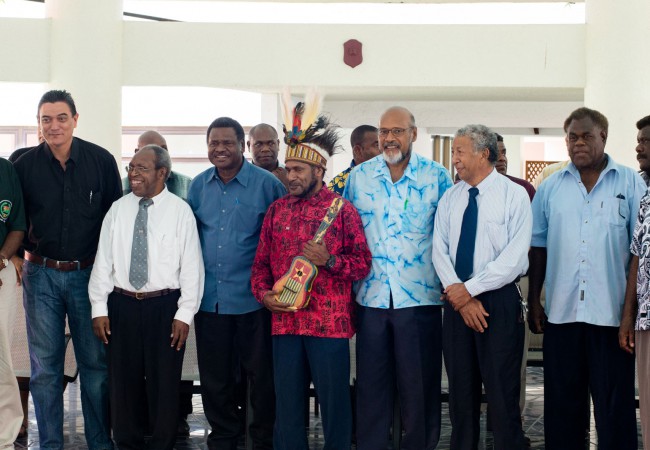
Echoes and ripples
West Papuan independence figure Benny Wenda’s recent visit to Vanuatu’s Parliament –an historic first– seems to have left echoes within its halls. The first indications of a schism within Sato Kilman’s government were on display last week as prominent government members Ham Lini and Moana Carcasses wandered off the reservation, joining the Opposition in welcoming Mr Wenda and supporting his appeal for West Papuan membership in the Melanesian Spearhead Group.
The vehemence of Opposition leader Edward Natapei’s demand that the government withdraw Indonesia’s observer status at the MSG and replace it with West Papua was underlined when the government’s stance against this issue was used as one of the levers to enlist popular support for yesterday’s abortive motion of no confidence.
It’s not known whether the issue will survive the transition from opposition to government, or whether, for that matter, such a transition will occur. Advocates for West Papuan self-determination may take heart from the warm words and many courtesies extended to them during their visit to Vanuatu, including an official welcome and the same perquisites as visiting diplomats. But the sincerity of these gestures will only be known when (or rather, if) the issue of West Papuan membership is ever brought before the MSG’s leaders.
So, while support for independence hots up in Papua New Guinea, with even Sir Michael Somare opening the door to the possibility of West Papua’s entry into the MSG, some in Vanuatu are worried that once again Vanuatu will ‘side step’ and revert to a characteristically softer stance on the issue.
It wouldn’t be the first time such a reversal has happened. As with so many issues, the principle of Melanesian independence is vastly simpler than the practicality of disentangling itself from two generations of Indonesian rule and reverting to its post-colonial status. Additionally, there’s every possibility that the Vanuatu government -no matter how it’s composed- will find itself entirely preoccupied with a daily struggle for survival. It may be that either side of the West Papuan independence issue will only be viewed as important to the extent that it provides legitimacy and support for the government of the day.
One thing is clear, however: Issues such as the plight of West Papuans can no longer be brushed off as entirely domestic in nature. Regional events are rippling into domestic waters. It’s clear that Indonesia’s recent friendliness to Sato Kilman’s government is obviously tied to his government’s acquiescence on the issue. Equally plausible is the perception that the Indonesians, who are themselves embarked on the long road back from dictatorship, are willing to invest time and energy in providing support (some might say cover) for Voreqe Bainimarama’s interim regime and its democracy roadmap.
No matter what the ultimate impact, Pacific nations are finding that they are not acting in a vacuum. Whether they choose to profit from the knowledge remains to be seen.

